Update: Nigeria gears up for Ebola
-
Health Minister Inspects Abuja airport health facilities, says “Don’t panic”
-
Screening of inbound passengers commences at international airports
-
NCDC conveys stakeholders meeting, inaugurates Ebola Preparedness Working Group (EPWG)
-
WHO Regional Director visits DR Congo for talks
The Minister of Health, Prof. Isaac Adewole today visited the Nnamdi Azikiwe International Airport, Abuja on inspection of port health facilities for the detection of Ebola disease and other haemorragic fevers as government intensifies efforts to ensure that the nation is not caught off guard in the advent of another outbreak in the country.
This follows the announcement by WHO of an outbreak of Ebola virus disease in Likati health zone, Bas Uele Province, in the northern part of the Democratic Republic of Congo. The Likati health zone is around 1400 kilometers from the capital. As of today, WHO reports that 11 suspected cases including 3 deaths have been reported.
Professor Adewole was reported to have urged Nigerians not to panic given the level of risk of possible transmission of the virus from the Central African country, DRC, to Nigeria.
“Nigerians are urged not to panic as the Nigeria Centre for Disease Control is equipped to secure the health of citizens. The agency has for a while now, been strengthening states capacities to detect, manage and respond to haemorrhagic fevers including Lassa fever,” the minister had said in a statement.
Nigeria has since commenced screening of all inbound passengers into the country at the Murtala Muhammed International Airport, Lagos and other International Airports in the country.
Also, the Nigeria Centre for Disease Control (NCDC) today convened an emergency meeting with representatives from the Department of Public Health and Port Health Services of the Federal Ministry of Health, World Health Organisation (WHO), The United Nations Children’s Fund (UNICEF), US-Centers for Disease Control, the African Field Epidemiology Network and the University of Maryland Baltimore to guide the country’s preparedness activities.
At the meeting chaired by the Chief Executive Officer of the NCDC, Dr. Chikwe Ihekweazu, an Ebola Preparedness Working Group (EPWG) was set up to lead on the coordination of the immediate risk assessment of the situation in the DRC and coordinate the strengthening of prevention and preparedness for any potential introduction of the virus into Nigeria, a press release from the centre disclosed.
The risk of introduction of the Ebola virus into Nigeria is considered to be highest through its air and land borders. Therefore, Port Health Authorities were advised to intensify existing screening procedures at all ports of entry with first responder teams being put on alert.
In addition, NCDC says there will be an increased focus on reinforcing principles of infection prevention and control to all healthcare workers across the country.
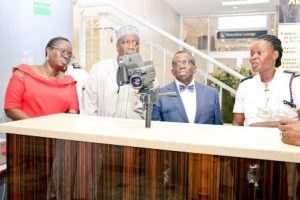
Health Minister, Professor Isaac Adewole inspecting port health facilities at Nnamdi Azikiwe International Airport, Abuja earlier on Monday
Meanwhile, the WHO Regional Director for Africa, Dr. Matshidiso Moeti visited Kinshasa (DR Congo)on Saturday to discuss with national authorities and partners ways to mount a rapid, effective and coherent response in order to stop the ongoing Ebola outbreak..
Speaking at the meeting, Dr Moeti said: “I am here to assure the government of DR Congo that in collaboration with the UN system and other partners, we will work together to respond to this outbreak. WHO has already mobilized technical experts to be deployed on the ground and is ready to provide the leadership and technical expertise required to mount a coordinated and effective response. I encourage to public to work with the health authorities and take the necessary preventive measures to protect their health.”
On 10 May 2017, a multidisciplinary team led by the Ministry of Health (MoH) and supported by WHO, under the new WHO Emergency Programme, and partners, was deployed to the Likati health zone, Bas Uele Province to conduct an in-depth field investigation. The health zone is situated in the remote, isolated and hard-to-reach northern part of the country, with limited transport and communication networks – factors that all impeded transmission of information about the suspected outbreak. Currently it takes about 2-3 days to reach the epicenter from Kinshasa.
The Global Outbreak Alert and Response Network (GOARN) has been activated to provide additional support if required. Reinforcement of epidemiological surveillance, contact tracing, case management, and community engagement are under way.
“We are grateful to WHO and other partners for the swift support in carrying out investigations that led to the confirmation of this outbreak,” said Dr. Oly Ilunga Kalenga, the Minister of Health of DR Congo. “A strong multi-sectoral response, better coordination, public awareness, community engagement and ade-quate resources will be critical in our efforts to stop the outbreak,” he added.
The first case occurred on 22 April in a 45-year-old male. He was transported by taxi to hospital and was dead on arrival. The driver also fell ill and later died. A third person who cared for the first case also be-came ill and has subsequently died. At present, 25 contacts of the second patient who died are being followed. Of the cases and deaths, 1 has been tested PCR-positive for Ebola.
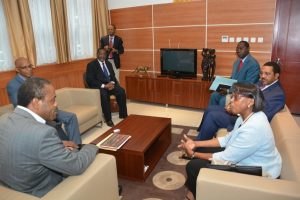
Dr. Moeti (Right) in a meeting with Dr. Oly Ilunga Kalenga. With them are: Dr Mamadu Diallo UN Humanitarian Coordinator in DRC and Dr Allarangar of WHO Photo credit: WHO/E. Kabambi
This is the eighth outbreak of Ebola virus disease since its discovery in 1976 in the Democratic Republic of Congo. On 20 November 2014, in line with WHO recommendations, the Ministry of Health of DRC and WHO declared the end of the Ebola Virus disease outbreak that started on 24 August 2014 and resulted in a total of 38 laboratory confirmed cases and 28 probable cases including 49 deaths in Boende, Equateur province.
Nigeria recorded her first and only outbreak of Ebola in 2014 when a Liberian-American, Patrick Sawyer arrived Lagos from Liberia. He became ill right at the airport and died five days later in a private hospital.
The government embarked on strenuous efforts to control the outbreak which left a total of 19 people infected out of whom 7 died. The country was declared free of Ebola transmission on October 20 by WHO.
Following this directive, the


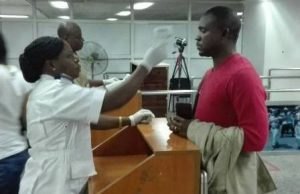
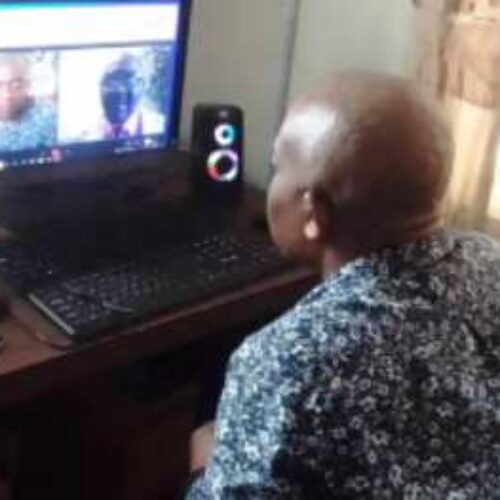
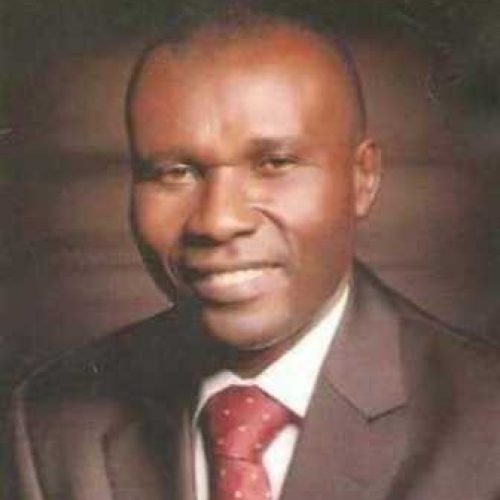
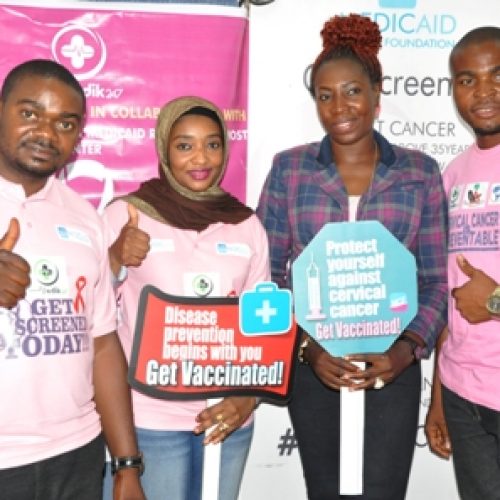


1 Comment
Elijah
May 16, 12:56